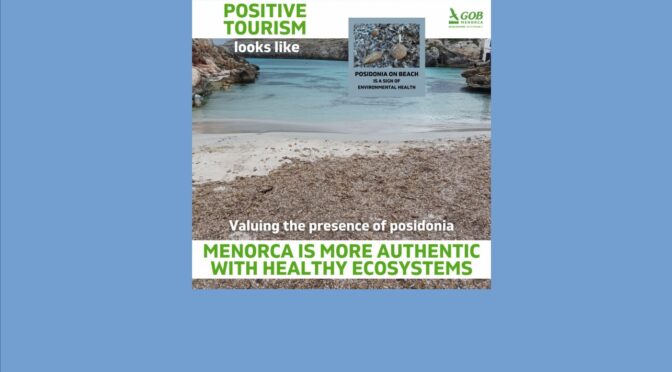Views: 737
This is the latest announcement as part of the campaign for Positive Tourism that we have been publishing in the last few weeks on some parts of tourism that need to be managed in a different way.
On this occasion, the chosen theme is the presence of posidonia on beaches. It is of great value but even so is removed from the parts of the coastline with the most tourists.
This peculiar plant, that is colonising the sea, that makes flowers and can live thousands of years, is intrinsically linked with the formation of the beaches on our islands. Scientific studies estimate that most of the sand is made from organisms that reproduce in the posidonia meadows.
The debris that reaches the seashore helps to capture the sand moved with the wind to form dune systems. They are also important for curbing the effects of winter storms.
Posidonia captures large quantities of CO2, holding the carbon in its stems and releasing oxygen. It constitutes one of the richest ecosystems at animal level in our marine environment.
Scientific publications suggest that posidonia could be the longest living species of the biosphere. Samples taken from the waters of Formentera show them to be more than 100,000 years old.
However, it grows very slowly, so that it is vulnerable to human aggressive activity. In our environment, the indiscriminate anchoring of many boats, the discharge of poorly purified emissions, brine returned to the sea from desalination plants, and the disturbance of mud that clouds the waters caused by aggressive use of motorboat engines, are some of the causes of degradation that are being observed.
In the last few years, legal protection has progressed for this species that forms a habitat considered a priority at a European level. It is no longer removed from most of the natural beaches and now there are surveillance boats to stop anchoring over the posidonia meadows.
Yet, how surprising that the tourist industry still calls for its removal from urbanized beaches. With the knowledge we have of the outstanding contribution made by this marine plant, its presence should be valued. Posidonia is not dirt.
What is dirt is the massive presence of plastics that are a consequence of a production system generating an enormous quantity of non-biodegradable rubbish, which is left uncontrolled in the environment. Going to the root of this global problem by stopping buying from providers that do not evolve into using biodegradable materials ought to be a universal commitment and a general request should be heard from tourist spokespersons given that they represent the most powerful economic activity in the archipelago.
You can see other announcements for the tourism campaign by clicking here Positive tourism

